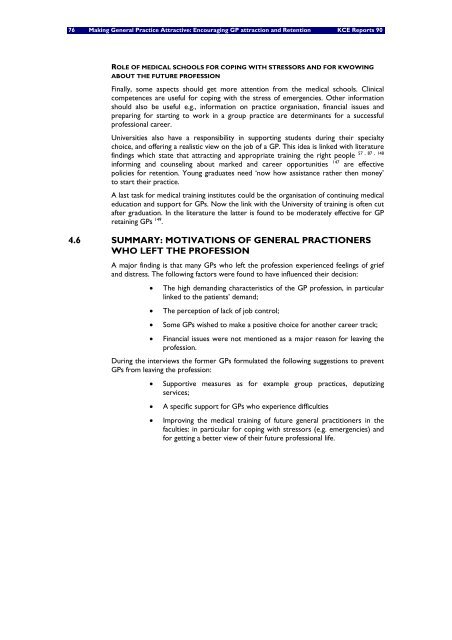Huisartsgeneeskunde: aantrekkingskracht en beroepstrouw ... - Lirias
Huisartsgeneeskunde: aantrekkingskracht en beroepstrouw ... - Lirias
Huisartsgeneeskunde: aantrekkingskracht en beroepstrouw ... - Lirias
You also want an ePaper? Increase the reach of your titles
YUMPU automatically turns print PDFs into web optimized ePapers that Google loves.
76 Making G<strong>en</strong>eral Practice Attractive: Encouraging GP attraction and Ret<strong>en</strong>tion KCE Reports 90<br />
ROLE OF MEDICAL SCHOOLS FOR COPING WITH STRESSORS AND FOR KWOWING<br />
ABOUT THE FUTURE PROFESSION<br />
Finally, some aspects should get more att<strong>en</strong>tion from the medical schools. Clinical<br />
compet<strong>en</strong>ces are useful for coping with the stress of emerg<strong>en</strong>cies. Other information<br />
should also be useful e.g., information on practice organisation, financial issues and<br />
preparing for starting to work in a group practice are determinants for a successful<br />
professional career.<br />
Universities also have a responsibility in supporting stud<strong>en</strong>ts during their specialty<br />
choice, and offering a realistic view on the job of a GP. This idea is linked with literature<br />
findings which state that attracting and appropriate training the right people<br />
57 , 87 , 148<br />
informing and counseling about marked and career opportunities 147 are effective<br />
policies for ret<strong>en</strong>tion. Young graduates need ‘now how assistance rather th<strong>en</strong> money’<br />
to start their practice.<br />
A last task for medical training institutes could be the organisation of continuing medical<br />
education and support for GPs. Now the link with the University of training is oft<strong>en</strong> cut<br />
after graduation. In the literature the latter is found to be moderately effective for GP<br />
retaining GPs 149 .<br />
4.6 SUMMARY: MOTIVATIONS OF GENERAL PRACTIONERS<br />
WHO LEFT THE PROFESSION<br />
A major finding is that many GPs who left the profession experi<strong>en</strong>ced feelings of grief<br />
and distress. The following factors were found to have influ<strong>en</strong>ced their decision:<br />
• The high demanding characteristics of the GP profession, in particular<br />
linked to the pati<strong>en</strong>ts’ demand;<br />
• The perception of lack of job control;<br />
• Some GPs wished to make a positive choice for another career track;<br />
• Financial issues were not m<strong>en</strong>tioned as a major reason for leaving the<br />
profession.<br />
During the interviews the former GPs formulated the following suggestions to prev<strong>en</strong>t<br />
GPs from leaving the profession:<br />
• Supportive measures as for example group practices, deputizing<br />
services;<br />
• A specific support for GPs who experi<strong>en</strong>ce difficulties<br />
• Improving the medical training of future g<strong>en</strong>eral practitioners in the<br />
faculties: in particular for coping with stressors (e.g. emerg<strong>en</strong>cies) and<br />
for getting a better view of their future professional life.

















